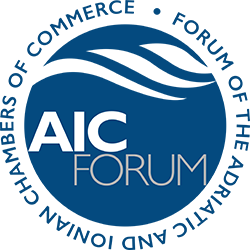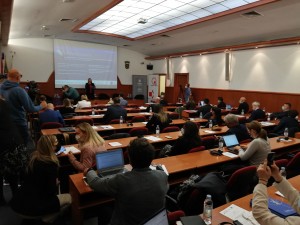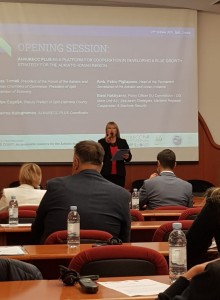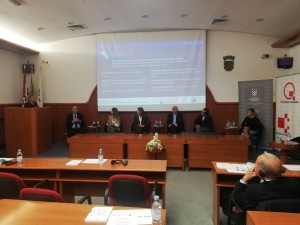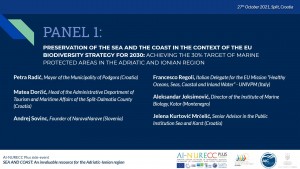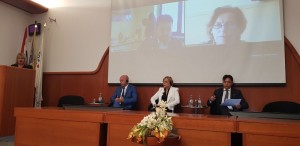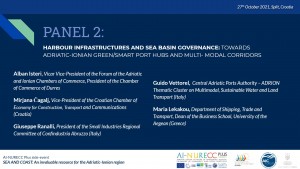In the framework of the AI-NURECC Plus Initiative, The Forum of the Adriatic and Ionian Chambers of Commerce, in collaboration with Split Chamber of Economy, organized the Side-Event to the first AI-NURECC Plus event, on the themes of Coastline management and preservation, that was held on the 27th of October 2021 in hybrid modality: both onsite and online, seeing the engagement of more than 100 participants.
The Adriatic and Ionian seas and their coastline represent a central and underdeveloped resource for the whole macro-region. This event brought together public and private stakeholders from the region to discuss strategies for a sustainable growth of maritime and coastal areas. In line with EUSAIR’s Pillar 1 on Blue Growth, the event aimed at sharing best practices and ideas on how to improve sea basin governance and promote research, innovation and business opportunities in blue economy sectors.
The agenda of the event comprised an opening session and two subsequent panels. The first panel discussion has been held on the topic of underwater and coastal preservation; the second one on the topic of harbor infrastructures and sea basin governance. Among the invited speakers, local government officials, researchers and academics, regional environmental officers, representatives of port authorities, chambers of commerce and companies from the Adriatic and Ionian countries.
Moderating the debate Ms. Sandra Barčot, journalist.
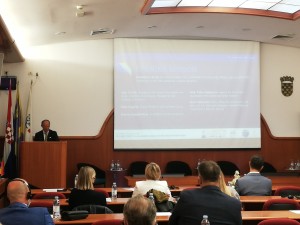 The meeting opened with greetings from the President of Split Chamber of Economy and of the Forum of the Adriatic and Ionian Chambers of Commerce, Joze Tomaš, who welcomed all the participants both online and onsite and introduced the speakers. He then stressed the importance of the occasion: “Our coasts and seas are one of the most important heritages in the Adriatic and Ionian region; it is now time to focus and invest in their protection through innovation and most of all Digitization processes in order to overcome the obstacles that threatens the environment and natural resources. I am very thankful to all the speakers that accepted our invitation and are here with us today to try and give positive responses and inputs to preserve our wonderful environment”. In closing, the President stressed the vital importance of the AI-NURECC Plus Initiative, thanking all the project partners for their commitment and wishing all the participants a good and fruitful day of interventions that could hopefully allow us all to give a better response to the necessities of the Adriatic and Ionian Area.
The meeting opened with greetings from the President of Split Chamber of Economy and of the Forum of the Adriatic and Ionian Chambers of Commerce, Joze Tomaš, who welcomed all the participants both online and onsite and introduced the speakers. He then stressed the importance of the occasion: “Our coasts and seas are one of the most important heritages in the Adriatic and Ionian region; it is now time to focus and invest in their protection through innovation and most of all Digitization processes in order to overcome the obstacles that threatens the environment and natural resources. I am very thankful to all the speakers that accepted our invitation and are here with us today to try and give positive responses and inputs to preserve our wonderful environment”. In closing, the President stressed the vital importance of the AI-NURECC Plus Initiative, thanking all the project partners for their commitment and wishing all the participants a good and fruitful day of interventions that could hopefully allow us all to give a better response to the necessities of the Adriatic and Ionian Area.
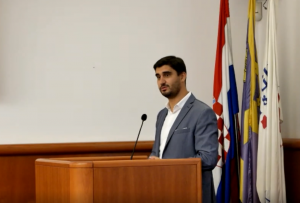 The opening session named “AI-NURECC PLUS AS A PLATFORM FOR COOPERATION IN DEVELOPING A BLUE GROWTH STRATEGY FOR THE ADRIATIC-IONIAN REGION”started with the intervention of Stipe Čogelja, Deputy Prefect of Split-Dalmatia County, who considered how 1200 km of coastline represent a great resource for the territory and therefore they have structured and implemented various projects. He once again underline how the coastline represents one of the region’s most precious resource and how education can teach the value of maritime heritage for the benefit of the next generations. Public and private individuals should support cooperation in the region.
The opening session named “AI-NURECC PLUS AS A PLATFORM FOR COOPERATION IN DEVELOPING A BLUE GROWTH STRATEGY FOR THE ADRIATIC-IONIAN REGION”started with the intervention of Stipe Čogelja, Deputy Prefect of Split-Dalmatia County, who considered how 1200 km of coastline represent a great resource for the territory and therefore they have structured and implemented various projects. He once again underline how the coastline represents one of the region’s most precious resource and how education can teach the value of maritime heritage for the benefit of the next generations. Public and private individuals should support cooperation in the region.
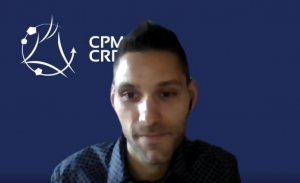 Emmanuel Maniscalco, Conference of Peripheral Maritime Regions (CPMR) – AI-NURECC PLUS Coordinator, offered participants a general overview on the AI-NURECC Plus Initiative, introducing the project partners and the main goals in the fields of sustainable tourism, cultural and creative industries and circular economy. He then focused on CPMR actions to foster cooperation and development of the area by encouraging the exchange of best practices.
Emmanuel Maniscalco, Conference of Peripheral Maritime Regions (CPMR) – AI-NURECC PLUS Coordinator, offered participants a general overview on the AI-NURECC Plus Initiative, introducing the project partners and the main goals in the fields of sustainable tourism, cultural and creative industries and circular economy. He then focused on CPMR actions to foster cooperation and development of the area by encouraging the exchange of best practices.
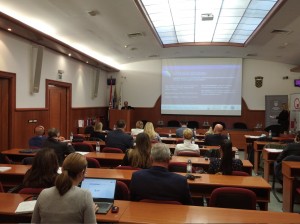 Amb. Fabio Pigliapoco, Head of the Permanent Secretariat of the Adriatic and Ionian Initiative, thanked again the President and all the collaborators of the Chamber of Commerce of Split for participating in the organization of such an inspiring and important meeting. The Ambassador stressed the existing link between the Adriatic and Ionian Initiative and the Civil Society; a connection that already existed during AI-NURECC Initiative and which is even stronger now with the second edition of the project. It is fundamental to act in close cooperation since without the active participation of Civil Society, the EUSAIR strategy is not a strategy, but a simple bureaucratic exercise.
Amb. Fabio Pigliapoco, Head of the Permanent Secretariat of the Adriatic and Ionian Initiative, thanked again the President and all the collaborators of the Chamber of Commerce of Split for participating in the organization of such an inspiring and important meeting. The Ambassador stressed the existing link between the Adriatic and Ionian Initiative and the Civil Society; a connection that already existed during AI-NURECC Initiative and which is even stronger now with the second edition of the project. It is fundamental to act in close cooperation since without the active participation of Civil Society, the EUSAIR strategy is not a strategy, but a simple bureaucratic exercise.
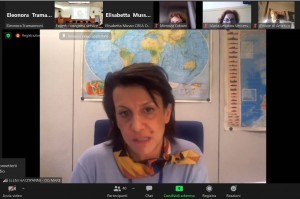 Eleni Hatziyanni, Policy Officer EU Commission – DG Mare Unit A3 | Sea-basin Strategies, Maritime Regional Cooperation & Maritime Security, intervened on the topic of maritime heritage and blue growth, affirming that it is time now to recall the necessity of cooperation in the Adriatic and Ionian Area. Adriatic and Ionian Countries are already doing big steps forward in a very effective way, but the European Green Deal is now in front of us and Blue Economy play a very important role, in terms of sustainability and green transition. AI-NURECC Plus has the capability to go to the right direction because it engages the four parts of a quadruple helix: academia, public authorities, private sector and society. DG MARE believes that AI NURECC Plus’ good partnership can act as a ground action for reaching the goals of Eusair Pillar1: Blue Growth.
Eleni Hatziyanni, Policy Officer EU Commission – DG Mare Unit A3 | Sea-basin Strategies, Maritime Regional Cooperation & Maritime Security, intervened on the topic of maritime heritage and blue growth, affirming that it is time now to recall the necessity of cooperation in the Adriatic and Ionian Area. Adriatic and Ionian Countries are already doing big steps forward in a very effective way, but the European Green Deal is now in front of us and Blue Economy play a very important role, in terms of sustainability and green transition. AI-NURECC Plus has the capability to go to the right direction because it engages the four parts of a quadruple helix: academia, public authorities, private sector and society. DG MARE believes that AI NURECC Plus’ good partnership can act as a ground action for reaching the goals of Eusair Pillar1: Blue Growth.
Once concluded the opening session; the event got to the heart of the discussion with the first panel: “PRESERVATION OF THE SEA AND THE COAST IN THE CONTEXT OF THE EU BIODIVERSITY STRATEGY FOR 2030: ACHIEVING THE 30% TARGET OF MARINE PROTECTED AREAS IN THE ADRIATIC AND IONIAN REGION” which saw the interventions of:
Petra Radić, Mayor of the Municipality of Podgora (Croatia);
Matea Dorčić, Head of the Administrative Department of Tourism and Maritime Affairs of the Split-Dalmatia County (Croatia);
Andrej Sovinc, Founder of NaravaNarave (Slovenia);
Francesco Regoli, Italian Delegate for the EU Mission “Healthy Oceans, Seas, Coastal and Inland Water” and Director of the Department of Life and Environmental Sciences, Marche Polytechnic University (Italy);
Aleksandar Joksimović, Director of the Institute of Marine Biology, Kotor (Montenegro);
Jelena Kurtović Mrčelić, Senior Advisor in the Public Institution Sea and Karst (Croatia).
The panel focused on Blue Growth and whether there is an existing dichotomy between economic development and effective protection of our ecosystem. The panelists gave their opinions on this topic, with a particular thought to future generations who will end up living out of the choices we are making now. A shared thought was that “as long as we talk too much and act too little, there is no doubt we will hurt the planet; it is essential to put in place a solid environmental education for our children”. Another strong point of discussion was the Food production sector: we are the only species that sows and collects food and this excessive food production affects biodiversity. The food we produce is always more than the real amount we need and in the fisheries sector the situation is particularly serious.
Innovation has been identified as the key element that allows us not only not to put a brake on development but also not to consider it as a separate entity from the protection of environments. in fact it is an economic choice to be made now: it costs much more to repair the damage than to prevent it.
The speakers to the first panel agreed on the necessity to implement a co-management of the coasts and seas; it is essential to create a network of stakeholders who care and need the safeguard of the environments and biodiversity: “we all agree on the need to protect the sea and its biodiversity, but we still need to learn a lot about it. We understand and we are conscious of the challenges we face, but many of them still need to be discovered and properly addressed. We must act to raise those future issues, and we cannot do it alone: the need for cooperation is evident and we are learning how to communicate scientific findings in a more usable way”.
The second Panel: “HARBOUR INFRASTRUCTURES AND SEA BASIN GOVERNANCE: TOWARDS ADRIATIC-IONIAN GREEN/SMART PORT HUBS AND MULTI-MODAL CORRIDORS” saw the interventions of:
Alban Isteri, President of Durres Chamber of Commerce and Industry (Albania), Vicar Vice President of the Forum of Adriatic and Ionian Chambers of Commerce;
Mirjana Čagalj, Vice-President of the Croatian Chamber of Economy for Construction, Transport and Communications (Croatia) and former President of the Forum of Adriatic and Ionian Chambers of Commerce;
Giuseppe Ranalli, President of the Small Industries Regional Committee of Confindustria Abruzzo (Italy);
Guido Vettorel, Head of Unit at Central Adriatic Ports Authority, Ancona, Italy – ADRION Thematic Cluster on Multimodal, Sustainable Water and Land Transport (Italy);
Maria Lekakou, Professor in Maritime Economics Department of Shipping, Trade and Transport, Dean of the Business School, University of the Aegean (Greece).
The panel focused on new and innovative ways of managing harbors. Being the sea the main way of communication in the Adriatic Ionian area, it was once again underlined the unequivocal necessity to act together in order to invest and capitalize. Covid-19 has certainly caused a stop in each and every sector and it will leave us with a different and ever changing world; therefore the themes and topics addressed even in panel 1 are key for the future. Some figures were given by the panelist: when analyzing the CO2 emissions situation, we can say that Europe is virtuous with only 8% of CO2 emissions, more in detail only 3,5% of this already mentioned 8% is to be linked to maritime transportation, which represents more than 90% of the import/export of the countries members of the European Union (regarding CO2 emissions, Europe has set very important objectives: -55% in 2030; CO2 neutrality in 2050). So, Europe is already doing its best, but this is a battle that needs to be fought globally.
Another topic addressed in this second panel has been the necessity to break down CO2 emissions of boats at the harbors; some examples were given: create innovative stations to provide electric energy, the use of new types of sustainable fuels, such as “natural liquefied gas” and so on.
In October/November 2020 The EUSAIR conducted a study survey related to Pillar 1 Blue Growth, with the aim of identifying the gaps, needs and opportunities to foster the implementation of EUSAIR flagship actions in the Adriatic-Ionian region. The responses showed that the participants (from various sectors –universities, companies, public, private…) considered as most important priorities: easier access to funds, increased networking between sectors, better management of fishing activities, creation of new jobs, improvement of governance of maritime space and creation of tools and services.
Let the debate continue!
Watch the RECORDING of the Event and interact with us on our social pages!
Facebook –Twitter – LinkedIn
